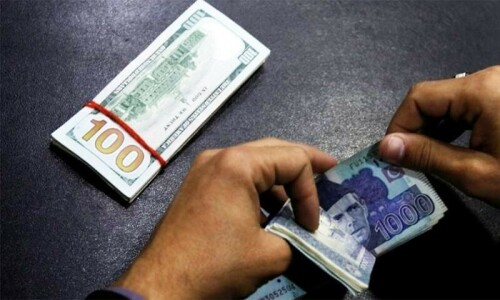KARACHI: Fear is high for the appreciation of the dollar as the premium for two months of forward selling has reached Rs8 per dollar, and exchange companies in the open market have halted dollar sales, except for travel purposes.
“This is strange; the exchange rate has been stable for more than a couple of months, but forward selling by exporters is attracting a premium of up to Rs8 per dollar for two months,” said Atif Ahmed, a currency dealer in the inter-bank market.
The perception that the current exchange rate is being managed is growing stronger with the increasing premium on forward selling.
Mr Atif noted that exchange companies are not providing dollars for students, health, and other requirements, even though thousands of students studying abroad require dollars from Pakistan. While exchange companies are allowed to provide dollars for such purposes, they are not bound to arrange dollars for students or health needs.
Exchange companies not selling dollars, except to travellers
Banks are not allowed to provide dollars for travel, student, or health purposes. However, the State Bank of Pakistan (SBP) has been encouraging banks to open their own exchange companies, potentially tightening the availability of dollars for the general public. The SBP has already closed B and C categories of exchange companies and suspended licences of several exchange companies across the country.
“Selling the dollar at premium clearly indicates the fear among dollar holders about devaluation of the local currency in coming months,” said Mr Atif.
However, some experts believe that the expected inflows of $1.2 billion from the IMF by the end of this month or beginning of April could improve Pakistan’s weak balance of payment situation and support the exchange rate.
“I have noted a few complaints about the shortage of dollars in the open market, or exchange companies not selling dollars except for travelling, but there is no shortage of liquidity,” said Zafar Paracha, General Secretary of the Exchange Companies Association of Pakistan.
However, he said that the additional charges by banks on the withdrawal of dollars could be a reason why exchange companies are not willing to pay. He explained that banks are charging Rs1.30 per dollar at the time of both deposit and withdrawal.
“I withdrew $100,000 from my own accounts two days back, and my bank charged a $330 fee without justifying the action,” he said. Banks do not impose charges when they are in need of dollars.
There was fear among currency dealers that the shortage of dollars for customers, such as students, would compel needy people to turn to the black market for Hundi and remit the amount they need for the students. The same thing may happen for health issues.
This is an old trend, and the demand for dollars helped the black market emerge as an alternative supplier in 2023, destroying the exchange rate and devaluing the PKR to Rs340 in the open market and Rs307 in the inter-bank market. The crackdown by the government at that time helped control the situation, closing illegal currency businesses and curbing smuggling of dollars.
Currency experts suggest that this is the time to gain control over the artificial shortage, which could again fuel the black market to become a monster.
Published in Dawn, March 3rd, 2024















































Dear visitor, the comments section is undergoing an overhaul and will return soon.